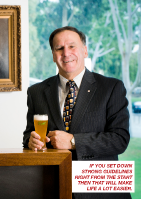Keeping It In The Family: For 150 Years!
As the executive chairman of Australia’s largest wholly Australian-owned brewery, the 150 year old coopers brewery in adelaide, glenn cooper offers spark readers his tips for success in creating and developing a family owned enterprise.
You are the Executive Chairman of Coopers Brewery, a business that has been in the family since it was established in 1862. Did you ever consider another line of business?
The Policy of Coopers is that nobody comes straight into the brewery. You go out and do your own thing first. I studied electrical engineering and I worked in a computer company and ran my own company. I didn’t join the brewery until I was 39 years old.
150 years is a pretty impressive lifespan for a family business. How have you been able to avoid external takeovers and internal faction-fighting for so long?
You have to understand that Thomas Cooper, who founded the brewery, had two wives and nineteen children. It was the sons of Thomas, and the step-brothers, who put into place the structure that is still in place in our boardroom today. That structure is quite a detailed one but basically it means that no one Cooper can take over the brewery. The structure through the board and through the constitution is very strong and very strict and therefore that avoids all the arguements.
We have also had hostile takeover bids. Back in 2005 Lion Nathan tried a takeover bid which we successfully defended.
Do you have any tips for other family-owned businesses?
Put in place a strong constitution, and work by that constitution. Problems in family business come up when there are no guidelines to go by and therefore other views, personal views, come into play. If you set down strong guidelines right from the start then that will make life a lot easier. Ours has got an advantage of 150 years so there’s been plenty of time to get all that right. I would also typically avoid, like we have, bringing in family straight from school. I totally disagree with it. Let them go out and do their own thing, then see if they’re appropriate for the business. Not just coming into the business because they’re family. They’ve got to have the skills and the desire to take the business on to the next generation.
The first time I heard of Coopers was with your home brew kits. It seems like a bold decision for a brewer to have a DIY range. Did it affect sales?
[Laughs] It was a very bold decision. I can say that it was actually a necessary decision because it saved the brewery. It was going broke in those days [the early ‘70’s] and it was able to get a product out all over Australia and make some profit. That saved the brewery. It did cause a lot of consternation amongst hoteliers in those days, but today it’s a very big part of business. We also ship the malt extract overseas as a food additive.
You are now the largest DIY beer producer in the world so you must be happy with the result.
Absolutely! It gives us good economies of scale even today.
Do you find expansion into new areas with your full range is more successful if the DIY beer has been distributed there first?
I think so, although I wouldn’t put a lot on it. DIY is almost like a hobby, so high sales of DIY beer won’t necessarily translate to high sales of regular beer.
Which entrepreneur would you most like to emulate and why?
[Pauses] Not any of the politicians, put it that way. A sportsman that I really admire is Pat Rafter. His business sense as well. That’s the kind of person I look up to. Someone who is open, honest and friendly and not let their success go to their head. I like genuine, successful people, not necessarily strong-minded and bullying successful people.
Coopers is the largest brewery in the country that is wholly Australian-owned. You are also a big supporter of sport and the arts, particularly in South Australia. How much do you think that sense of belonging in the community has strengthened the Coopers brand?
Particularly in South Australia it has given us a very strong position. We have just completed sponsoring the V8 Supercars throughout Australia and that is a real big step up for us in terms of a nation sponsorship.
You recently won the Ernst and Young Entrepreneur of the Year 2012 Champions of Entrepreneurship, Central region Category. What is your most memorable achievement with the business?
The Supercars was very good for us. The Adelaide Fringe festival is another major one.
What has been the biggest influence in your business’ success, and why?
I think winning the battle against Lion Nathan. It was a bit of a David and Goliath battle, and I think that was pretty good for us all around. That battle was the greatest moment of my time without a doubt.
What has been your biggest challenge for the business?
The biggest challenge we’re going to face is the duopoly of Coles and Woolworths. It’s a challenge to be able to protect our margins and do business. We have to make sure that we have a consumer-driven product, not a price-driven product.
Can you give our readers your top tips for business success?
The most important thing in a small business is to create your own brand if you can. Our point of difference is no preservatives or additives.
Avoid doing ‘me to’ products. Even if it might be more expensive, I think that is the way to go.
What are the plans for the next five years?
Keep doing what we are. We’ve just taken on three international brands which we are brewing in Adelaide. Saporo, Carlsberg and Kronenberg.
By Neil Donnelly
Posted on December 17, 2012
Leave a Reply
Latest Blogs




